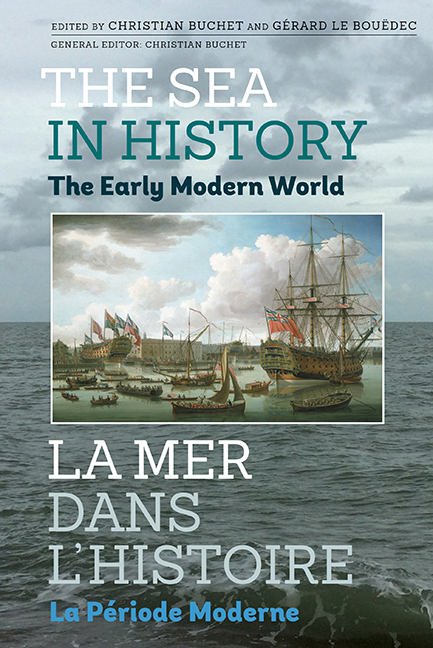Book contents
- Frontmatter
- Contents
- List of Illustrations
- List of Contributors
- Introduction générale et remerciements par
- General introduction and acknowledgements
- Introduction (français)
- Introduction (English)
- LA RÉUSSITE PAR LA MER:La reussite par la mer des territoires et des communautés littorales
- La construction d'un espace mondial: La circulation maritime et les ports
- La forte croissance de l'économie des pêches et des échanges
- Les acteurs de la dynamique maritime
- LA PUISSANCE MARITIME INSTRUMENT DE LA PUISSANCE POLITIQUE ET D'UNE STRATÉGIE GLOBALE DE RAYONNEMENT VOIRE DE DOMINATION: Les puissances maritimes occidentales
- L'océan Indien, entre convoitises et indifférences
- Les puissances maritimes asiatiques
- L'Afrique
- La politique maritime et l'idéologie
- De la décision de se tourner vers la mer
- La Chine et la mer. Retour sur images
- Mare Liberum, Mare Clausum: oceanic shipping and trade in the history of economic thought
- Social structure and naval power: Britain and the Netherlands
- British governmental values and British naval bureaucracy
- Les retombées littéraires et philosophiques des découvertes maritimes
- Le modèle maritime polynésien, ou l'océan source de stimulation intellectuelle
- Mer et développement technologique
- Développement maritime et maîtrise économique et financière
- Développement maritime et maîtrise organisationnelle
- Conclusion (français)
- Conclusion (English)
- Conclusion générale par
- General conclusion by
- Miscellaneous Endmatter
- Miscellaneous Endmatter
Social structure and naval power: Britain and the Netherlands
from La politique maritime et l'idéologie
Published online by Cambridge University Press: 11 May 2017
- Frontmatter
- Contents
- List of Illustrations
- List of Contributors
- Introduction générale et remerciements par
- General introduction and acknowledgements
- Introduction (français)
- Introduction (English)
- LA RÉUSSITE PAR LA MER:La reussite par la mer des territoires et des communautés littorales
- La construction d'un espace mondial: La circulation maritime et les ports
- La forte croissance de l'économie des pêches et des échanges
- Les acteurs de la dynamique maritime
- LA PUISSANCE MARITIME INSTRUMENT DE LA PUISSANCE POLITIQUE ET D'UNE STRATÉGIE GLOBALE DE RAYONNEMENT VOIRE DE DOMINATION: Les puissances maritimes occidentales
- L'océan Indien, entre convoitises et indifférences
- Les puissances maritimes asiatiques
- L'Afrique
- La politique maritime et l'idéologie
- De la décision de se tourner vers la mer
- La Chine et la mer. Retour sur images
- Mare Liberum, Mare Clausum: oceanic shipping and trade in the history of economic thought
- Social structure and naval power: Britain and the Netherlands
- British governmental values and British naval bureaucracy
- Les retombées littéraires et philosophiques des découvertes maritimes
- Le modèle maritime polynésien, ou l'océan source de stimulation intellectuelle
- Mer et développement technologique
- Développement maritime et maîtrise économique et financière
- Développement maritime et maîtrise organisationnelle
- Conclusion (français)
- Conclusion (English)
- Conclusion générale par
- General conclusion by
- Miscellaneous Endmatter
- Miscellaneous Endmatter
Summary
ABSTRACT. This contribution shows that there is an interaction between the nature of society, the nature of the political system and the nature of military activities. Societies adopting the trade dynamics, based upon an opened, social and political system, with a strong implication of the middle classes, have been able to benefit from a virtuous circle of growth based on the maritime development of a strong naval force, contrary to the closed states which rely on their autocratic institutions, a strong land army and a rural economy.
RÉSUMÉ. Cette contribution montre qu'il y a interaction entre la nature de la société, la nature du système politique, et la nature des activités militaires. Les sociétés s'inscrivant dans une dynamique commerciale, fondée sur un système social et politique ouvert, avec une forte implication des classes moyennes, ont été en mesure de profiter d'un cercle vertueux de croissance fondé sur le développement maritime et l'édification d'une puissante force navale, à la différence des états fermés reposant sur des institutions de nature autocratique, une puissante armée de terre et une économie rurale.
It is not entirely original to note that different kinds of social organisation fit naturally with different kinds of armed force. Aristotle, to look no further back, was clear that ‘light-armed troops and the navy are wholly on the side of democracy’, because the oarsmen of Greek warships were drawn from the poor free citizens, who had nothing to contribute to the war effort but their muscles, whereas the cavalry and infantry were recruited from the well-to-do who could afford horses, armour and weapons. It is worth the historian considering whether such a linkage can be established in later European history. Is it mere coincidence that in the English and Dutch cases naval power was associated with forms of representative government, while the great military powers (France, Prussia, Russia, Austria) were all autocratic monarchies? It is a matter of observation that army officers have traditionally been noblemen or gentlemen, while navies have tended to be run by middle-class professionals on whom the aristocratic concept of honour sat somewhat awkwardly. Is this coincidence, or is it in the nature of a navy to favour constitutional rather than autocratic government? If there is a connection, which is cause and which effect?
- Type
- Chapter
- Information
- The Sea in History - The Early Modern World , pp. 679 - 685Publisher: Boydell & BrewerPrint publication year: 2017



